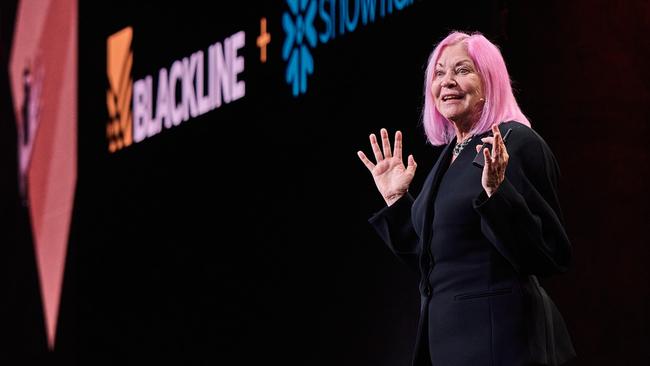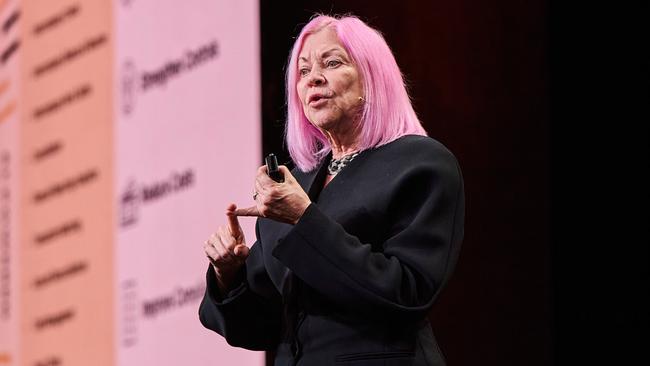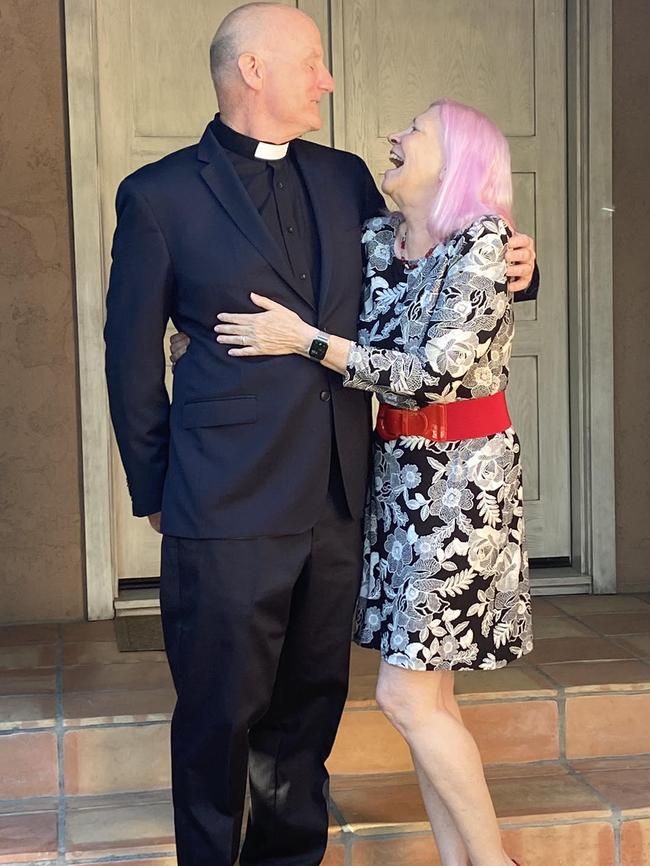The pink-haired CEO who loves tattoos, nose rings and crazy clothes
Dying her hair pink just before a Nasdaq listing as a way to stand out as a founder ended up transforming the culture of US tech giant BlackLine and propelling Therese Tucker’s wealth to more than $500m.
The Vidal Sassoon hair salon on Wilshire Boulevard in the ritzy Los Angeles suburb of Beverly Hills takes the name of the famed British hairstylist and businessman who in 1973 founded a global brand of haircare products that changed hairdressing forever.
In early 2015, the salon played host to a visit from technology entrepreneur Therese Tucker, who after a career in computers and technology had founded an American enterprise software company she called BlackLine.
Tucker had been asked that week by her top marketing executive to appear in a new promotional advertisement for the firm.
“I just said, ‘Oh my God, we are already in accounting software. An older woman in a suit … People are just going to snooze,” she now recalls telling him.
Finally she agreed to do the video, but on one condition: that she dyed her hair pink.
“It has been the most interesting social experiment ever since,” she says. “I’m sitting there in the chair that day at Vidal Sassoon with my new pink hair, and I look over and some old guy with shoe polish black hair is smiling at me. I’m like, ‘That’s odd’. He looks over and he goes, ‘Hey, that hair looks like fun. Did you get that hair to have some fun?’ I was like, ‘What the hell?’.”
Tucker even asked informal permission from her board to adopt her new hip hairstyle because it was only months before BlackLine listed on the Nasdaq, making Tucker one of the first female founders to lead a venture-capital-backed, Los Angeles-based start-up to an initial public offering.
Fast forward a decade and BlackLine now has more than 4400 customers globally and two-thirds of the American Fortune 50, including nine of the top 10. Its market capitalisation is more than $US3.2bn ($5bn).

Australia was BlackLine’s first international market, and today its software is used by local firms such as Qantas, Coles, NAB, Medibank, Treasury Wines and Jemena for all their financial accounting.
Tucker, 63, has a net worth of more than $400m, and she still proudly sports a pink rinse.
She believes her unusual look has created a workplace where people can bring their authentic selves to work. For the past 10 years, BlackLine has been home to many colours of hair, piercings, tattoos and what she calls “crazy” dress.
“It allows people to show up in their own skin,” she says. “If you are spending energy trying to be something that you are not, that is not energy that you are putting into your work. I’m not going to get the most out of people if they can’t show up and be themselves.
“I worry that as we get bigger, we lose that. But that is really important, because talent comes in all kinds of packaging. It doesn’t only come in square-jawed, middle-aged white guys.”
Tucker has always thought it was easier to be a female entrepreneur than a tech company employee in the US, given the daily sexism and harassment she has experienced working at a range of firms.
In 1999, her then boss sat down between her and a colleague and started running his hands up their skirts before asking: “I’ve done so much for you girls. What are you going to do for me?”
Her colleague, who reported the incident, was eventually sidelined in the firm.
“There have been dozens of incidents,” Tucker says. “Ask any woman anywhere if they have been sexually assaulted at work and if they are honest, they are probably going to say yes.
“When I was coming up through the ranks, you definitely did not report harassment or your career would end for sure. So you learned how to deal with it.”
She now hopes women in Silicon Valley are being more vocal about what is unacceptable behaviour by their male colleagues.
But asked whether she is worried about a cultural regression under the policies of the new Trump administration, with a bleak look, she simply replies: “I am so discouraged about our country’s future right now that I’d rather not comment on it.”
Early farm life
Tucker grew up on a farm in Illinois in the American Midwest driving tractors and herding cows with her three sisters.
But one of her earliest memories will stick in her mind forever.
When she was two, her neighbours sprayed so much DDT insecticide on their property – before it was outlawed – that it killed her father’s entire herd of cattle.

“I remember toddling around looking at these giant carcasses that used to be cows, and then Dad and all of us trying to keep the cows that were still alive walking so they had a better chance of surviving,” she says.
Two decades on, despite there being no history of cancer in the family, her sister Roseanne was diagnosed with the disease at the age of 28 and died four years later. Tucker was 25 at the time.
“I loved her like crazy. I even moved to California because that was where she lived,” she says, adding that she named her daughter after her late sister.
Tucker’s oldest sister, Karen, was later diagnosed with breast cancer. But being a lawyer, she went on the front foot and researched the most effective forms of treatment and the best surgeons. “She fought it super aggressively, and she is still alive today. She’s one of my best friends,” Tucker says.
“I’ve had my own scares, absolutely. I had one last year that was no fun at all. They basically take a hollow core drill to you to get samples out. But I was clear. It is something that I always try to stay on top of. So the learning from my sister’s passing is to face things head on. Be proactive, don’t ignore it, don’t wait.”
Tucker’s father died in 1999 at the age of 79, the year Tucker split from her husband Brian, a marine on the USS Missouri who she had met in a laundromat.
She was a single mother of two children under 12 with no savings and a previous failure as an entrepreneur when she started BlackLine in 2001.
“We worked very hard at the divorce so the kids did not suffer. We did a million hours of counselling, which helped me become a better manager,” she says.
“We also got to be friends. We started going for walks and we started laughing about some of the terrible dates that we had been on, and remembering why we liked each other so much.
“I think we both grew a lot, thought about what was important, and found we had pretty good shared values.”
They remarried in 2005 after Brian returned from a 10-month tour of duty in Iraq and have been together since. After quitting the navy and being a hospital chaplain for nine years, he is now an Episcopalian priest.
But the toughest trial of Tucker’s personal life was watching from afar the decade-long decline of her mother, who died of Alzheimer’s disease near Chicago in 2012 at the age of 83.
“My oldest sister bore most of the burden, honestly. I contributed financially, but I lived in California,” she says.
She will never forget the shock during one visit of taking her mother to lunch and the conversation that followed.
“I had both of my kids in the back seat, and my mum looks over at me and goes, ‘Who are you?’ I was totally crushed. So I said, ‘Mum, I’m your daughter.’ Then she goes, ‘No, you’re not.’ So I’m like, ‘Mum, I’m getting all upset. I’m being disowned.’ I did get all upset. Then she just casually goes, ‘OK, then’,” Tucker recalls.
“With people with Alzheimer’s, the thing about not knowing is they lose the sense of what age they are. So I think she looked at me and thought, ‘I couldn’t possibly be the mother of somebody this old’. An experience like that teaches you that you can survive anything. Including being disowned!”
Executive role
Tucker has always been best suited to building software rather than business building, which is why in early 2021 she and the board brought in former Deloitte executive Owen Ryan as CEO of BlackLine to scale the company.
But what she hoped would be an early retirement from executive life was short-lived. She returned as co-CEO in March 2023 and still owns nearly 8 per cent of the company.
“Owen and I have been in our roles as co-CEOs for a little more than a year now and our complementing experiences and skillsets within this new structure are putting us on the path to future growth,” she says.
“Owen always says that if we were each 20 years younger, we’d kill each other, but now we are both very concerned about each other’s health.”
Australia remains an important market for BlackLine, and Tucker has long admired the “direct and open” nature of the firm’s local customers. “They give you the feedback. They are very Californian in that regard,” she quips.

Embedding AI throughout its platform and bringing to market new AI-based products that are game changers for BlackLine’s customers is a key focus for Tucker and Ryan. She believes AI will change how people do accounting in a “seismic” way.
“There are so many wrinkles to this across literally hundreds of accounting processes,” she says.
“I know I’m such a nerd, but I’m personally obsessed with that because I really think that this is something for which you must think through all the different potential iterations and possibilities and apply the technology properly. Because this stuff is powerful. You do it the wrong way, you are going to screw a lot of things up.”
Her substantial wealth has resulted in Tucker and her husband putting money into a range of philanthropic causes over many years, especially for the homeless and the hungry.
“I believe that in a country as wealthy as America, nobody should ever be hungry,” she says.
“There’s got to be a way to use AI in the future to distribute resources in a way that they get to the right people in the right time.”
Tucker also has a range of property investments, including a flat in Paris that she purchased last year. She has been taking intensive French language lessons and plans to work out of BlackLine’s Paris office for a week a month this year.
But in California, she is still living in the house she and her husband bought 35 years ago in the San Fernando Valley neighbourhood of West Hills. One of her daughters and her five cats have just moved in for an extended period – she is back living in her childhood bedroom – after losing her home in recent Los Angeles fires.
Tucker’s upbringing and her life of riding through tragedy and triumph has given her a unique perspective on wealth.
“It took me many years to realise when I was younger that we were actually quite poor. But it never impacted my happiness, because I was totally loved by my entire family,” she says.
“You come out of it with a great perspective on money. There is no denying that money is a wonderful tool to help solve problems. But it can never be the source of your happiness. It can’t be the source of figuring out who you are.”




To join the conversation, please log in. Don't have an account? Register
Join the conversation, you are commenting as Logout